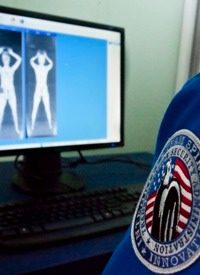
After years of assurances from government officials that the feds’ full-body scans of airline passengers and other persons are discarded immediately and never saved, the truth comes out: Some federal agencies have indeed been keeping the images.
As a result of a lawsuit by the Electronic Privacy Information Center, which is seeking an injunction against such scanners in airports, it has emerged that the U.S. Marshals Service has retained over 35,000 full-body images of persons entering the Orlando, Fla., federal courthouse, Declan McCullagh reported at CNet News.
On top of that, added McCullagh, another scanner tested in the Washington, D.C., federal courthouse was returned to the manufacturer with the images still in the machine’s database. Where those images are now is anybody’s guess.
The Transportation Security Administration has not been implicated thus far, but its specifications for airport scanners are not encouraging. McCullagh wrote:
A 70-page document showing the TSA’s procurement specifications, classified as “sensitive security information,” says that in some modes the scanner must “allow exporting of image data in real time” and provide a mechanism for “high-speed transfer of image data” over the network. (It also says that image filters will “protect the identity, modesty, and privacy of the passenger.”)
The TSA has also admitted, in a letter to the House Homeland Security Committee, that the scanners “have the capability to retain and export images only for testing, training, and evaluation purposes,” though it insists that the machines delivered to airports are incapable of storing, printing, or transmitting images.
While some might be lulled into believing that TSA scanners really do delete the images, EPIC executive director Marc Rotenberg is having none of it, telling McCullagh that the “devices are designed and deployed in a way that allows the images to be routinely stored and recorded, which is exactly what the Marshals Service is doing.” Furthermore,
“TSA is not being straightforward with the public about the capabilities of these devices,” Rotenberg said. “This is the Department of Homeland Security subjecting every U.S. traveler to an intrusive search that can be recorded without any suspicion — I think it’s outrageous.” EPIC’s lawsuit says that the TSA should have announced formal regulations, and argues that the body scanners violate the Fourth Amendment, which prohibits “unreasonable” searches.
Of course, one man’s unreasonable is another man’s reasonable; and when the government gets to decide what is reasonable, one can be certain it will be defined as broadly as politically possible.
Besides, even if one trusts government officials not to misuse the images they have stored, only a fool would trust them to protect those images from prying eyes. The feds have a miserable track record when it comes to keeping Americans’ private information private. For example, an employee of the Department of Veterans Affairs took home personal data (including Social Security numbers) on millions of veterans in electronic form; when the employee’s home was burglarized, the data was stolen. The Commerce Department lost over 1,000 laptop computers, many containing Americans’ personal information, over a five-year period.
It is ironic that under a President who promised more openness in government a lawsuit was required to lay bare the feds’ lies about their body scanners. The federal government’s intrusions into Americans’ privacy since 9/11 have done much to increase Washington’s control over our lives but little, if anything, to increase our security. Instead of bowing before Uncle Sam and allowing him to strip us naked, Americans need to point out that he, indeed, has no clothes.
Photo: AP Images



